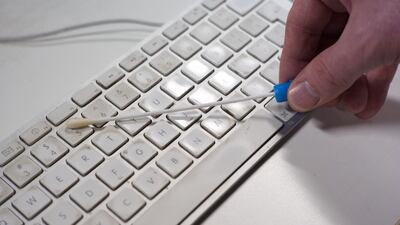If you think the bathroom is the most germ-infested hot spot of your office, you are mistaken. Results from The National’s swab test of the office have shown that commonly touched work surfaces, such as keyboards and telephones are a prime breeding ground for infection, according to health and safety experts.
_____________________________________________________________
Contents:
1- Desks are the most germ-infested spots in the office
2- Most commonly touched areas are the dirtiest in the workplace
_____________________________________________________________
In this package:
Part 1: Tests show The National's office is rife with germs / Germs lurk in many offices and homes, survey finds
Part 2: UAE employers must give workers hygiene knowledge / Unclean workplaces are harming employees, say UAE doctors
Interactive: Germs that lurk in The National office
_____________________________________________________________
Desks are the most germ-infested spots in the office
ABU DHABI // What do you think is the most germ-infested hot spot of your office?
If you answered the bathroom then think again.
Illness-causing bacteria are more likely to linger on commonly touched work surfaces such as keyboards, computer mouse or office phones and the average desk is a prime breeding ground for infection, according to health and safety experts.
In fact an average keyboard can have 200 times more bacteria than a toilet brush, according to Dr Sundar Elayaperumal, a specialist in microbiology at Burjeel Hospital in Abu Dhabi.
“This is because we are using them very often, especially in some offices where keyboards are shared by different people,” he said. “Bacteria is coming and is deposited and there is not proper cleaning of the keyboard.”
A study entitled ‘How many bacteria live on the keyboard of your computer?’, published in the American Journal of Infection Control in 2011, looked into keyboards as a possible vehicle for infection transmission.
It said that as many workers eat at their desk their keyboards may be a breeding ground for bacteria. Workers with poor hand hygiene are also directly contaminating their own keyboard, while droplets of saliva that inevitably fall on the keyboard during talking, sneezing, and coughing also increase the risk on infection.
The authors of the study analysed swabs obtained from the keyboards of 30 computers and found microbes on all keyboards, examples of mould, yeast, bacteria including Staphylococcus aureus, Staphylococcus epidermidis, Micrococcus and Enterococcus.
Past studies have found more than 3,000 organisms per square inch on a keyboard, and more than 1,600 on a computer mouse.
Despite this, Dr Elayaperumal said many office workers probably cannot remember when they cleaned their keyboard, mouse, and phone.
“Cleaning your keyboard is different to disinfecting your keyboard. Cleaning takes the dust away but disinfecting it means you are removing the bacteria that has colonised on the keyboard. But it will come back — it is a continuous phenomenon.”
This is why it is so important to regular disinfect a keyboard and other areas in your workspace, he said.
Ideally workers should use a disinfectant wipes in the morning and again at the end of the day before leaving work, he said.
“This is a good prevention against bacteria.”
Eating at your desk should also be banned, he said. Crumbs can become lodged in between keys and encourage more bacteria to breed.
“A cup of coffee is fine but food — no,” he said.
_____________________________________________________________
Most commonly touched areas are the dirtiest in the workplace
ABU DHABI // A number of studies have revealed the dirtiest places in the workplace to be, unsurprisingly, the areas multiple people come into frequent contact with.
These include handles to washrooms, microwave handles, keyboards, refrigerator door handles, water fountain buttons, vending machine buttons, computer mouses and desk phones.
If one member of the office fails to wash their hands, their colleagues can pick up their bacteria by touching the same door handles and surfaces.
Those organisms then risk being transferred when people touch their eyes or mouths.
A 2012 study carried out by Kimberly-Clark Professional looking at workplaces hygiene in the Unites States identified workplace hot spots where germs can lurk.
Hygienists collected nearly 5,000 individual swabs from office buildings housing more than 3,000 employees.
According to the study, the percentage of the office surfaces tested and found to have high levels of contamination includes 75 percent of break room sink faucet handles, 48 percent of microwave door handles, 27 percent of keyboards, 26 percent of refrigerator door handles, 23 percent of water fountain buttons and 21 percent of vending machine buttons.
“The most commonly touched surfaces are hand rails, door handles, telephone headsets and computer keyboards,” said worker health expert Dougie Collin. “If a canteen is used, trays and eating utensils need to be very well cleaned if they are not to harbour bacteria.
“Standards are based on risk and it is usual to build up a trend of contamination from human contact through swabbing but it is not uncommon to have trays, toilet areas, door handles and hand rails cleaned with a biocide wash on a daily basis as a minimum.
“Keyboards and other computer equipment including chairs is less frequent, typically weekly but again the frequency should be increased if the items have multiple users in any day or week.
“Hand driers in toilets are more hygienic than towels due to no contact with dispensers but people realising the value of hand santising is the most important factor.”
Mr Collin said scare tactics may encourage people to be cleaner.
“Educating workers on the spread of bacteria from hand to hand or from the sharing of things like tools and even computer keyboards is one way,” he said. “Showing people how contaminated they could be by using UV light systems that can be made to show how poorly some people clean their hands is another.”
jbell@thenational.ae

